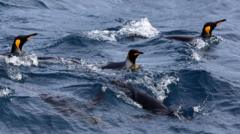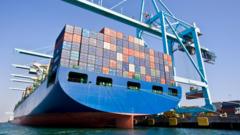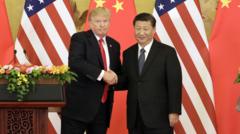The imposition of tariffs on the Heard and McDonald islands by the US government has ignited surprise and confusion, particularly among Australian officials, who describe the measure as a “rushed process.”
US Tariffs on Uninhabited Islands Spark Controversy and Confusion

US Tariffs on Uninhabited Islands Spark Controversy and Confusion
The US defends its decision to impose tariffs on remote islands populated only by wildlife, insisting on the need to close trading loopholes.
The US Commerce Secretary, Howard Lutnick, has publicly supported the imposition of tariffs on these uninhabited islands, home primarily to penguins and seals. According to Lutnick, the move aims to eliminate “ridiculous loopholes” that allow foreign countries to route shipments through these islands to gain access to the US market. This statement followed the revelation of the tariffs, which took authorities in Australia by surprise, with Trade Minister Don Farrell labeling it a “clearly a mistake.”
While responding to queries regarding the inclusion of the Heard and McDonald islands in the tariffs list, Lutnick emphasized that excluding any territories could allow foreign competitors to exploit the situation. “If you leave anything off the list, the countries that try to basically arbitrage America go through those countries to us,” he noted, asserting that the President is determined to counter such practices.
Following a notable drop in US stock indexes, which fell by over 5% last week, government officials have been actively defending the tariffs. The new trade measures have raised concerns over the implications for global markets, with analysts pondering the broader impacts.
Shipping practices, particularly transshipment, have come under scrutiny, as they can facilitate illicit activities by concealing the actual route and nature of shipments. According to estimates from the Pew Charitable Trusts, large volumes of tuna and similar species are traded illegally through these methods in the Pacific region alone.
As for trade between the US and the Heard and McDonald islands, export data from the World Bank indicates minimal exports, with a report of approximately USD 1.4 million attributed to machinery in 2022. Additionally, the British Indian Ocean territory, predominantly occupied by military personnel and requiring a special permit to visit, is also on the tariffs list, having exported a lower amount of approximately USD 414,350 to the US in the same year.
Such unexpected tariffs raise questions about their actual efficacy and broader implications, sparking ongoing debate and concern among international observers.
While responding to queries regarding the inclusion of the Heard and McDonald islands in the tariffs list, Lutnick emphasized that excluding any territories could allow foreign competitors to exploit the situation. “If you leave anything off the list, the countries that try to basically arbitrage America go through those countries to us,” he noted, asserting that the President is determined to counter such practices.
Following a notable drop in US stock indexes, which fell by over 5% last week, government officials have been actively defending the tariffs. The new trade measures have raised concerns over the implications for global markets, with analysts pondering the broader impacts.
Shipping practices, particularly transshipment, have come under scrutiny, as they can facilitate illicit activities by concealing the actual route and nature of shipments. According to estimates from the Pew Charitable Trusts, large volumes of tuna and similar species are traded illegally through these methods in the Pacific region alone.
As for trade between the US and the Heard and McDonald islands, export data from the World Bank indicates minimal exports, with a report of approximately USD 1.4 million attributed to machinery in 2022. Additionally, the British Indian Ocean territory, predominantly occupied by military personnel and requiring a special permit to visit, is also on the tariffs list, having exported a lower amount of approximately USD 414,350 to the US in the same year.
Such unexpected tariffs raise questions about their actual efficacy and broader implications, sparking ongoing debate and concern among international observers.






















